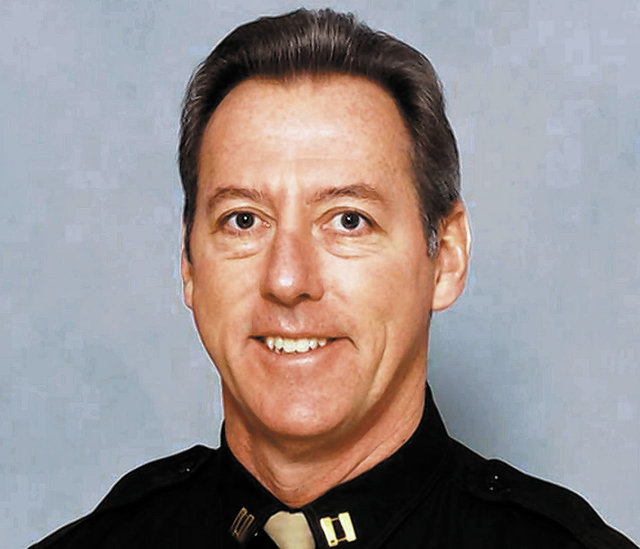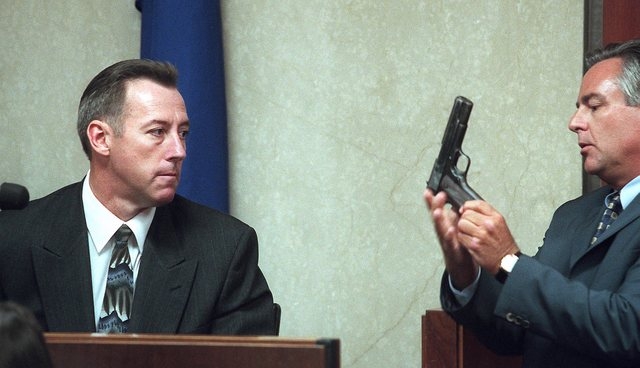Two years later, a captain’s choice after a police shooting could sway sheriff’s election
Clark County sheriff’s candidate Larry Burns has a reputation for backing his troops.
But some in the Las Vegas police department say Burns went too far when, as a Metro captain, he ignored an order to extend the probation of a lieutenant who came under scrutiny following the 2011 shooting of Gulf War veteran Stanley Gibson.
That seemingly low-key decision, largely unnoticed at the time, may help former Lt. David Dockendorf reverse his demotion by Sheriff Doug Gillespie, according to several top police officials with knowledge of the situation.
Regardless of Dockendorf’s fate, the incident is becoming an election-year issue. Retired Assistant Sheriff Ted Moody, who is also a candidate for sheriff, calls it a prime example of Burns’ long history of failing to hold officers accountable for their actions.
“Larry Burns’ track record clearly shows that his loyalties lie with the police unions, not with the community, and I don’t see that changing. That’s why he’s their candidate,” Moody said.
Burns recently received 91 percent of the vote in an officer’s union straw poll, easily beating Moody and the other leading candidate, Assistant Sheriff Joe Lombardo.
Burns called Moody’s criticism politically motivated and baseless.
“I terminated as many people as anybody else at this department. It’s not a contest, but that’s the truth,” he said. “Anybody who says differently about Larry Burns is way off and covering their own conscience.”
Clark County sheriff elections are typically one-sided affairs, with the outgoing sheriff handpicking a successor who seldom faces significant opposition. This year is different.
Moody and Burns enter the June primary in a fight to determine who will take on Lombardo in the November general election. Lombardo is considered the front-runner because he is endorsed by Gillespie and has a large campaign fund.
Dockendorf’s appeal will likely be resolved around the time of the June primary, according to department officials, and the outcome could affect the primary vote.
CONTROVERSIAL CHOICE
On the night of Dec. 12, 2011, Metro officers responding to a report of an attempted burglary at an apartment complex tried to detain Stanley Gibson, a Gulf War veteran suffering from post-traumatic stress disorder. Gibson, confused and lost, refused to get out of his car after the officers blocked it with their cruisers. After a long standoff, Gibson, who was unarmed, was shot several times and killed by officer Jesus Arevalo. Arevalo said he mistook another officer’s firing of a glass-breaking bean-bag shotgun round for gunfire coming from the car.
In command of the scene was David Dockendorf, who had been a police lieutenant for 11 months — one month shy of completing the department’s mandatory year of probation following a promotion.
In the aftermath of the shooting, Burns extended Dockendorf’s probationary period for six months. He said he wanted to see if Metro’s internal investigation supported the description of the incident Dockendorf had given him immediately afterward.
But six months later, with police and district attorney’s office reviews of the Gibson shooting still pending, Burns allowed Dockendorf to pass probation. He said he made the decision after he read the preliminary report of the shooting from the department’s Critical Incident Review Team.
“I read every piece of this review as if I were doing it professionally for another agency. What I found was that it substantiated exactly what Dockendorf had told me the night of the shooting,” Burns said. “He was on scene for 12 minutes. And in those 12 minutes, he makes some really good decisions.”
A respected police tactician with years of experience as a SWAT commander, Burns said he didn’t think his lieutenant was being treated fairly.
Dockendorf was placed on modified duty following the shooting. While he wasn’t in the field and his actions that night were still under investigation, those months of desk work still counted toward meeting probation, Burns determined.
Burns apparently made the decision against the wishes of his boss, although he disputes that he ignored an order.
“If anybody tells you that someone told me to extend (his probation), that is false. That was never said to me, ever. I’ve heard (people say) I was told to do that, ordered to do that. They’re saying someone gives a captain an order and then the captain doesn’t follow that order?”
Assistant Sheriff Kevin McMahill, who was Burns’ deputy chief at the time, tells a different story. He said he wanted Burns to extend Dockendorf’s probation until the full investigation was completed.
“No doubt about it, I had asked him to extend it,” McMahill said. “We had that conversation several times.”
McMahill said he was on vacation when Dockendorf’s probation expired. He said he questioned Burns about it after the fact.
“Larry … said he did not think he could justify a second extension because it was for the same reasons we had extended the first time,” he said. “Certainly that did not meet with the expectations I had provided to him. But Larry felt very strongly that he couldn’t justify it, so he didn’t extend it.”
McMahill also questioned the weight Burns placed on Dockendorf’s light duty.
“We judge a lieutenant’s performance as a field lieutenant, and Dave Dockendorf was on modified duty,” McMahill said. “He was not operating as a field lieutenant.”
Burns, after being told of McMahill’s comments, emphatically denied that he disobeyed an order.
“If you disobey a direct order, that’s anarchy,” he said. “How could I expect anyone to follow me as a sheriff if that was the example I set?
“There’s no way Larry Burns, a SWAT commander for seven years, with life and death hanging in the balance based on my orders being kept, there’s no way that guy disobeys a direct order from his boss,” Burns said. “Doug Gillespie does not allow captains in his organization to pick and choose the orders he’s going to obey.”
Neither Gillespie nor Lombardo would comment for this article, saying to do so could taint the arbitration of Dockendorf’s appeal.
If Burns had kept Dockendorf on probation, Gillespie would have more control of the officer’s future. He could have demoted him to sergeant with little chance of being overruled by an arbitrator, or put him in a position where he wouldn’t supervise patrol operations.
That’s partly why Gillespie declined to fire Detective Bryan Yant, who shot and killed Trevon Cole in 2010 during a botched drug raid. Instead, Yant has for years been assigned to desk duty.
If the arbitrator sides with Dockendorf, he’ll likely be reassigned as a field lieutenant.
‘CONTACT REPORT’
For allowing Dockendorf to make probation, Burns appears to have been given a “contact report” — a minor written reprimand that is purged from an officer’s personnel file in a year.
Burns said he only recently learned about the contact report when an unsigned copy was produced at Dockendorf’s arbitration hearing. Burns said he testified under oath that he’d never seen it before.
“I never got anything from Kevin,” he said. “When? Where’s the signed copy? Show me a signed copy. I’m just absolutely perplexed where this comes from. It’s very frustrating to me.”
McMahill said he wouldn’t accuse Burns, who could be his boss next year, of lying.
“I’m not saying anybody lied. Whatever the recollections are, that’s what they are,” he said. “But those are the facts as I know them.”
Burns said that last week he sought clarification from McMahill, but still can’t explain the discrepancy.
“I guess we are remembering some things differently,” he said.
ARGUMENTS FOR EXTENDED PROBATION
Moody, who supervised both McMahill and Burns while at Metro, said Burns should have extended Dockendorf’s probation.
“Given the severity of allegations pending against Dockendorf, it was the duty and obligation to the safety of the community and other officers to extend Dockendorf’s probationary period pending outcome of a thorough investigation. In fact, it was just plain common sense,” he said.
Burns said he wasn’t going to keep Dockendorf on probation to make it easier to punish his officer.
“In their minds, it was a foregone conclusion to demote Dave Dockendorf. What does that tell you about the integrity of the process? If you’re talking about taking his stripes and the bars on his collar, well, take them through the front door. Not some slimy, back door way. That’s not right, that’s as biased as anything there is,” he said.
Moody said no one at the department presumed Dockendorf’s guilt.
“Those are outright lies, and how dare Larry Burns accuse anybody in his chain of command of coming to a foregone conclusion about the facts in this case,” Moody said.
Gillespie, following the recommendation of the department’s Use of Force Review Board, announced Dockendorf’s demotion 18 months after the shooting.
Burns said he disagreed with the move. The board, revamped by Moody over concerns about officer-involved shootings, was flawed because it was dominated by biased civilians, he said.
“The board used to be full of retired cops, and people thought it was loaded (for Metro) and not transparent,” Burns said. “It’s also not transparent when you go out to the public and search for special interest groups who have a dog in the fight to make something that was historically wrong right again.”
Moody said Burns is trying to shift blame to protect his officer and justify his own bad decision.
“Burns should not forget there were four commissioned board members involved and they all concurred with the findings in this case,” he said. “Burns ought to be honest and admit that if anyone’s representing a special interest group, it’s him. His special interest is representing the PPA (police union).”
All politics aside, Burns makes no apologies for his handling of the aftermath of the Gibson shooting.
“What’s right is right,” Burns said. “I did my part. This arbitrator will do what an arbitrator does.
“At the end of the day this was a tragedy,” Burns said. “A man lost his life, and it was awful for all of us. There is no celebration there.”
Contact reporter Mike Blasky at mblasky@reviewjournal.com or 702-383-0283. Follow @blasky on Twitter.



















